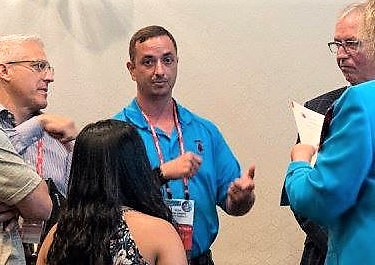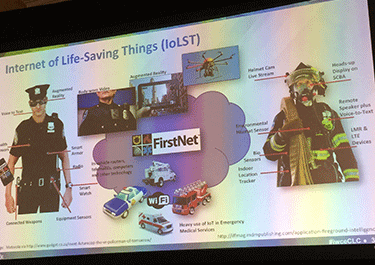 When a soldier realizes he or she can no longer serve, what comes next? There is often a period of transition while they recoup their minds and bodies, and reimagine their lives and careers. Victor Johnston reconnected with technology.
When a soldier realizes he or she can no longer serve, what comes next? There is often a period of transition while they recoup their minds and bodies, and reimagine their lives and careers. Victor Johnston reconnected with technology.
Now President of Johnston IT Consulting (JIT), LLC in Fayetteville, NC, his transition wasn’t by choice. “I saw myself a professional soldier, loved the Army and was very proud of what I was doing. But after getting injured while serving, and undergoing a Medical Evaluation Board, I realized I would not be able to return to active duty status. That led me to start asking, ‘what do I do next?’”
The answer to that question came through the Wounded Warrior Project and its Transition Training Academy, a program that offered CompTIA’s A+, Network+ and Security+ certifications. Johnston took advantage of all the available resources, and it opened the door to a professional IT career. “When I was younger, I fixed my buddies' computers for spare cash, removing viruses and other things. But the truth is, I never saw it as a true career opportunity until I reached the pressure point when transitioning out of the military.”
The opportunities came quickly. Johnston’s first official job was with a government contractor. “I was brought in as a Tier One Service Desk Analyst and realized I had a knack for that work and worked my way up to a tier-three senior service desk analyst. In a matter of months, they made me responsible for training technicians and their lead data recovery agent. My quest to learn was insatiable, and the work gave me incredible pride.”
Over the next couple years, Johnston worked in a variety of tech roles while building his skill set and industry knowledge. In May 2012, after assessing his success and priorities, he decided to make another life-changing transformation. Johnston started his own IT consulting firm.
“My first client was trying to take advantage of newer technologies and mobility was a big factor. I enjoyed helping them refine their processes based on new technologies. Working with small businesses really opened my eyes and I loved playing a part in their success.”
JIT is more than a tech consulting firm. The firm helps its clients develop advanced strategic focuses, provides soft skills training, and offers technological innovation.
“We start with the strategic renovation of existing technology solutions. I look at their current systems, learn why they're using it and what they hope to get out of it, and then suggest improvements. Process automation is a goal, but we help them define and refine processes before creating technology-based solutions. Vision refinement and mission alignment are critical.”
Giving Back
While getting his career and business on track, Johnston made sure to set aside time to help others. He stayed involved in the Wounded Warrior Project and other veteran’s programs and started working with community organizations such as the Boy Scouts.
That involvement included work with their STEM program. “A lot of these kids see technology and a light switches on in their head. It can make a difference in their lives and those of others and gives them career opportunities worth pursuing. The thought leadership exhibited in Boy Scouts appealed to me and I wanted to be a part of it.”
Johnston also gives back to the industry. As vice-chair of the CompTIA Future Leaders Community, he uses his voice to promote the opportunities in tech to millennials, returning veterans and anyone looking for rewarding career options.
The interactions with other community leaders and members inspire his creativity and help drive key group initiatives. The rebranding of technology is one of them. “Though we haven't picked a name for the project yet, we’re trying to make technology more attractive to kids. It's forcing us to remember why we got into tech and what keeps us in the industry.”
Education Is Key
Another way Johnston gives back is through teaching. After attaining three Master’s degrees, he sees education as an equalizer. “As a college professor, I have had the opportunity to help socioeconomically disadvantaged adults grow their knowledge and skills, and get a foot up. I want to break that cycle, to ensure students leave school understanding more than just processors, but what they need to do with the information to be successful in their careers.”
That’s a lesson worth noting for educators and business professionals. Johnston adjusts his curriculum instruction based on his students’ intended degree paths and directly targets his message to their strengths and interests.
“I teach like I'm selling to somebody. By directly connecting with each student’s educational value proposition ‒ their reason for being in school ‒ it exponentially increases their understanding of the material.”
“That's what got me in education; I wanted to help shape positive futures. Anyone willing to go deep into debt deserves a chance to build a valued career, not just get a degree or piece of paper.”
Why should IT business owners care? “If you constantly need to force someone to do something, it’s time to change how you're selling it.” He emphasizes that few people are genuinely bad, but may require a different training or educational approach. Providing that type of insight is one of Johnston’s personal missions.
“With the Wounded Warrior Project, I was able to help them address some of the limitations I experienced during my time in the Transition Training Academy. A lot of military personnel in those classes have substantial injuries and are often on multiple medications, and success is the only way they can successfully transition into their new roles.”
That “pay it forward” mentality is what keeps Johnston balanced. He enjoys lending a hand to those in need, and his participation in various activities helps improve his business and outlook on life. It may be difficult to put a business ROI on engagement and philanthropy, but the personal rewards are immeasurable.

 Add CompTIA to your favorite RSS reader
Add CompTIA to your favorite RSS reader

